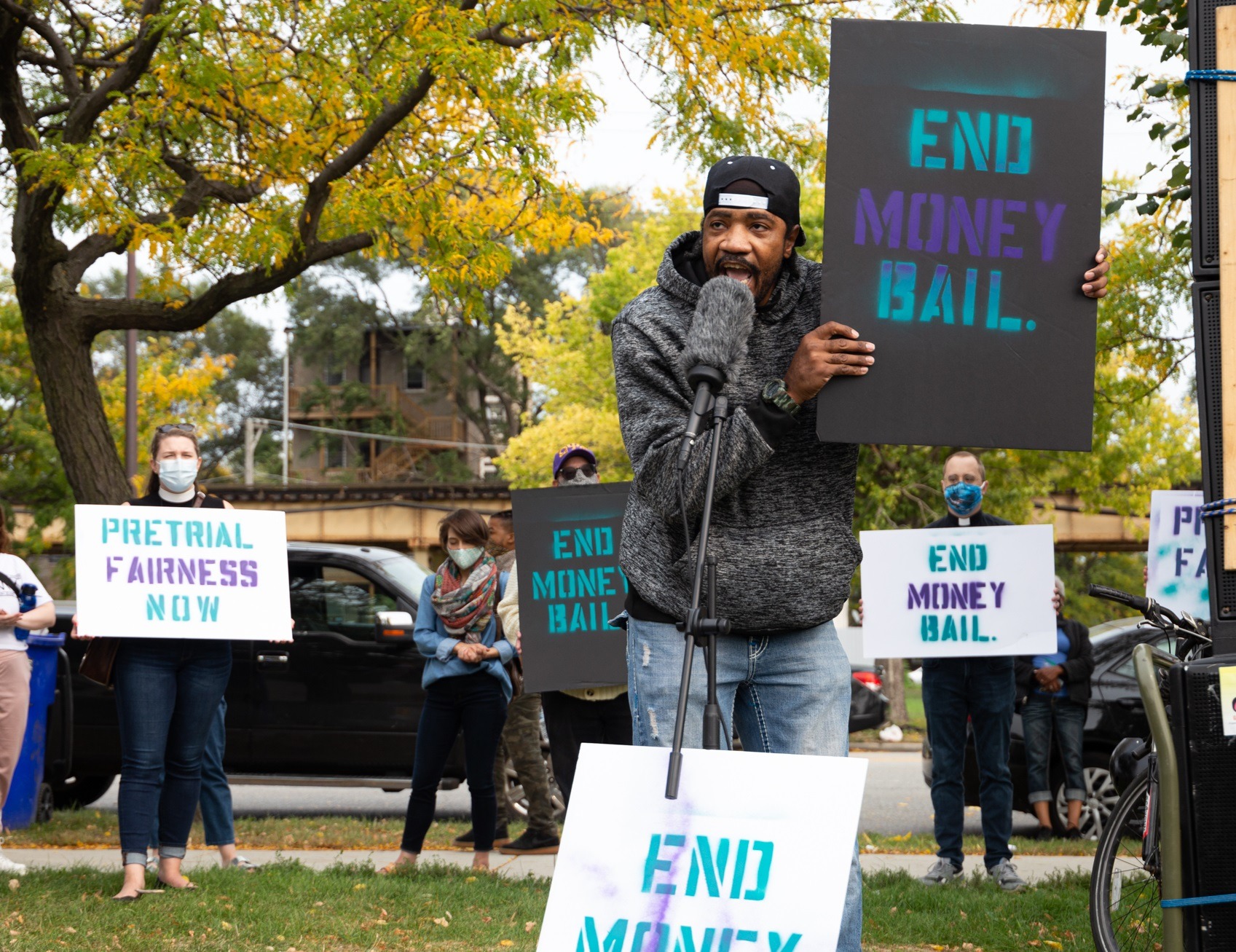Illinois State Lawmakers Vote To Eliminate Cash Bail
The move is part of a broader criminal justice reform bill that also ends prison gerrymandering, and mandates body cameras for all police departments.

Jeffrey Pendleton was held at the Cook County Jail for close to two years. On March 26, in the midst of the first wave of the COVID-19 pandemic, the court denied his public defender’s request to lower his $50,000 bond, according to news reports. Unable to pay the $5,000 he needed to be released, he remained in jail.
By March 30, Pendleton had tested positive for COVID-19 and was taken to Stroger Hospital. At the hospital he was shackled, by hand and foot, to the bed, according to a lawsuit filed by his family. He died on April 5, at the age of 59. He is the first known prisoner from Cook County Jail to die from COVID-19.
“We asked for an expedited bond review on this client and to be released from jail before trial. We lost that fight,” Cook County Public Defender Amy Campanelli tweeted after Pendleton’s death. “He should have been sent home.”
On Wednesday, state lawmakers took action to help prevent tragedies like this from occurring. They approved House Bill 3653, an omnibus criminal justice reform bill championed by the Illinois Legislative Black Caucus which, among many other provisions, eliminates cash bail.
“For questions around safety, money has no relevance and all that it does is increase inequities and racism in the system,” said Sharlyn Grace, executive director of the Chicago Community Bond Fund, a member of the Coalition to End Money Bond.
The latest version of the bill was introduced shortly before the vote, prompting its opponents to accuse the bill’s supporters of rushing it through in the last hours of the lame duck session before new legislators were sworn in.
In addition to eliminating cash bail, the bill bans chokeholds “unless deadly force is justified,” ends prison gerrymandering, and mandates, over a multi-year phase-in, body cameras for all police departments. The bill prohibits officers from firing firearms or impact projectiles indiscriminately into a crowd and from targeting a person’s head, pelvis, or back with non-lethal projectiles. The legislation also changes Illinois’ felony murder law.
Law enforcement condemned both versions of the bill, claiming the provisions would jeopardize the lives and safety of residents. Contrary to their claims, studies have shown that limiting cash bail does not affect crime rates.
The legislation abolishes cash bail—a system that made avoiding pretrial detention contingent on an ability to pay—in all circumstances except when required by laws and agreements Illinois entered into with other states.
Cash bail has been widely condemned as criminalizing poverty. Recent polling conducted by The Lab, a policy vertical of The Appeal, found that more than half of likely voters surveyed in Illinois support a presumption in favor of release for those accused of crimes.
People accused of almost all misdemeanors and most low-level felonies cannot be jailed pretrial at an initial hearing, Grace explained. For those charged with what are considered more serious offenses, courts will be required to hold hearings to determine if a person poses a danger to a specific person or is a “willful flight risk,” meaning they intend to evade prosecution. “Past non-appearance in court alone is not evidence of future intent to evade prosecution,” the bill reads.
Risk assessment tools, which have been found to be racially biased, can not provide the sole justification to deny someone pretrial release. In cases where a court orders electronic or GPS monitoring, or home confinement, the court must review its order every 60 days to determine if less restrictive conditions can be imposed.
Under the current system, said Grace, “the decision of whether or not to jail or release someone is being made in mere minutes.” This bill passed, she said, “ensures that there are going to be robust, meaningful, adversarial hearings before somebody’s liberty is taken away.”
The governor applauded the bill’s passage, but did not explicitly state he would sign it.
“I was proud to make ending cash bail and modernizing sentencing laws a legislative priority of my administration,” Pritzker said in a statement released Wednesday. “I have long pledged my support to the Illinois Legislative Black Caucus in their efforts to pass not just criminal justice reform and police accountability measures, but also to truly root out the systemic racism that pulses through all our nation’s institutions.”
Those who are incarcerated because they can’t afford bail can face catastrophic consequences. Pretrial incarceration can lead to a person losing their job, housing, and custody of their children. It can also have serious ramifications for their case. Those who are incarcerated are more likely to plead guilty and more likely to receive harsher sentences than those who are free pending resolution of their case.
And in the midst of the COVID-19 pandemic, a jail stay, as in the case of Pendleton, can be fatal. On Dec. 7, 370 people incarcerated at the Cook County jail tested positive for COVID-19—more than the previous high of 307, on April 10, according to data obtained by the Chicago Sun-Times.
As of Jan. 13, 91 incarcerated people at the jail have tested positive for COVID-19, which includes four people who are hospitalized, according to the Cook County Sheriff’s website. Nine detainees who tested positive for COVID-19 have died. Four correctional officers and one deputy have died due to complications from COVID-19.
“[Jail has] always been violent, it’s always been dangerous, but COVID has made it even worse,” said Sharone Mitchell Jr., director of the Illinois Justice Project, a member of the Coalition to End Money Bond. “For us it’s really about significantly reducing the jail population as a whole and we think the offshoot of that will be, you will see less deaths in custody.”
